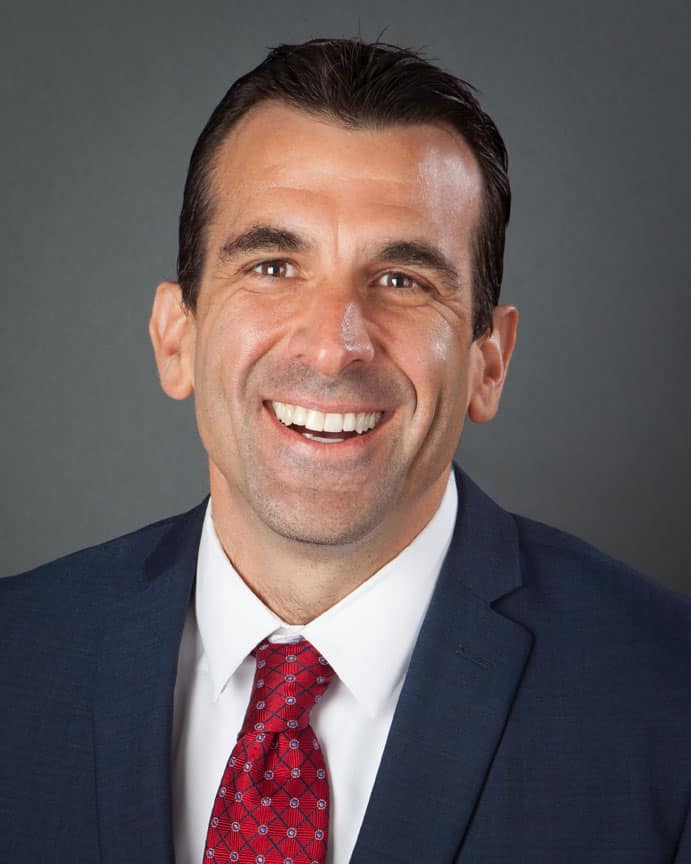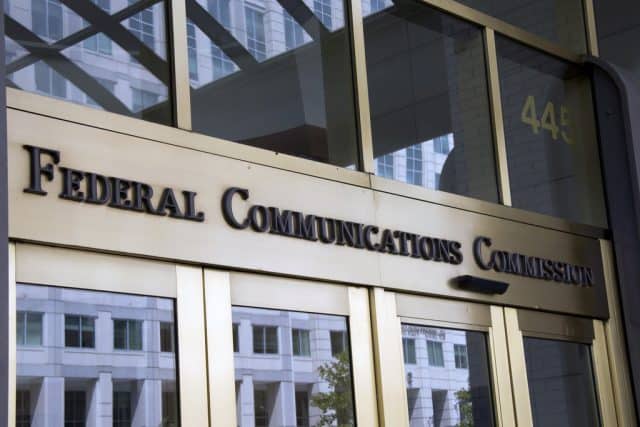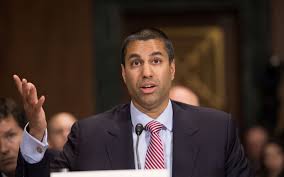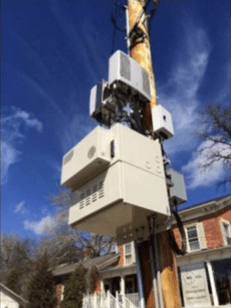
Liccardo
San Jose Mayor Sam Liccardo has resigned from the Federal Communications Commission’s Broadband Deployment Advisory Committee (BDAC), claiming the panel has been stacked with telecom industry players that will advocate for the interests of the telecom industry, not the public.
“It has become abundantly clear that despite the good intentions of several participants, the industry-heavy makeup of BDAC will simply relegate the body to being a vehicle for advancing the interests of the telecommunications industry over those of the public,” Liccardo wrote in his resignation letter.
The corruption was baked in from the earliest days of the BDAC, originally created by FCC Chairman Ajit Pai in January 2017 to help resolve the digital divide between those who have access to internet service and those who don’t. BDAC was charged with providing advice and recommendations on how to accelerate the deployment of high-speed internet access. Pai used the BDAC partly as a front group to advocate for his own long-standing goal of reducing or eliminating what he believes are regulatory barriers to infrastructure investment.
Controversy erupted almost immediately as the BDAC member nomination process began. Pai and his staff packed the 30-member group with telecom industry corporate executives, trade groups, and free market scholars frequently funded or sponsored by telecom companies. According to the Center for Public Integrity (CPI), the FCC initially accepted only two of the 64 city and state officials nominated to serve on a committee that was likely to recommend major changes to local and state zoning and permitting laws. Liccado was one of the two.
CPI filed a Freedom of Information Act request with the FCC to force the agency to divulge detailed information about applicants and those approved to serve as panel members. They found three out of four members appointed worked for big telecom companies like AT&T, Comcast, Sprint, and TDS Telecom. Crown Castle International Corp., the nation’s largest wireless infrastructure company, and Southern Co., the nation’s second-largest utility firm, also have representatives on the panel. The “broadband experts” chosen as members largely came from conservative think tanks that have industry funding ties or connections with wealthy conservative donors like the Koch Brothers.
Liccardo sensed trouble on the committee as early as last August.
“It’s not lost on us that among the 30-odd members of the BDAC, only two represent local government,” Liccardo said. “We’ll see where things go in the weeks ahead, but it’s fair to say the footprints are in the snow.”
Gary Carter, who works for the city of Santa Monica, Calif., where he oversees City Net, one of the nation’s oldest publicly owned networks, thought he would be the perfect candidate to serve on the BDAC. The FCC didn’t think so.
 “When I called [the FCC] to check on the status of the BDAC selection process [earlier this year] and identified myself as an employee from the City of Santa Monica, the gentleman on the phone laughed hysterically,” Carter said. “At first I didn’t get the joke. When I saw the appointees for the municipal working group—only three out of 24 positions were from local government—I got the joke.”
“When I called [the FCC] to check on the status of the BDAC selection process [earlier this year] and identified myself as an employee from the City of Santa Monica, the gentleman on the phone laughed hysterically,” Carter said. “At first I didn’t get the joke. When I saw the appointees for the municipal working group—only three out of 24 positions were from local government—I got the joke.”
The corruption has not been a surprise to one telecommunications executive serving as a BDAC member. He candidly told CPI the committee was purposely “stacked” to guarantee findings and proposals that echo Pai’s anti-regulatory agenda.
“It’s definitely stacked towards private enterprise,” said the executive, who requested anonymity due to fear of retaliation from FCC officials. “It’s nothing new. The [current] FCC serves private enterprise.”
Nick Degani, senior counsel to the FCC and Pai’s wireline legal advisor, told BDAC members at a July meeting that only a few city officials were chosen because they are the ones that need guidance, not telecommunications companies.
City and state officials locked out of Pai’s panel warn that BDAC recommendations could soon lead to new rules that will ignore local residents’ wishes in favor of the interests of cable, phone, and wireless companies. Recommended rule changes could allow telecom companies to gain free or very low-cost access to public buildings on which it can place cell towers or the small cells that will end up on utility poles. Much of the equipment the industry wants to place threatens to clutter neighborhoods with unsafe, overloaded utility poles and some new infrastructure could block scenic views or be placed in sensitive environmental areas.
 CPI spoke with many local officials who asked to participate as a member of BDAC, but were turned down:
CPI spoke with many local officials who asked to participate as a member of BDAC, but were turned down:
“There are reasons you have to get a permit if you want to dig up the side of the street,” said David Frasher, city manager of Hot Springs, Arkansas, who also was nominated—but turned down—for a seat on the BDAC.
“The city needs to know if you’re going to block traffic or create a hazard to sidewalk users,” Frasher said. Maybe there’s a way to streamline those regulations, “… but with only 10 percent city government representation, how helpful will the end product be?”
The FCC also didn’t choose David Guttenberg, member of the Alaska state legislature. He said service providers writing local rules for internet deployment makes him fear for Alaskan residents, many of whom have such poor wireless service that they have trouble downloading emails.
“They [telecommunications companies] are only going to look after their own self interests,” Guttenberg said. “Find me the guy that works for telecommunications on this committee that’s going to sign onto a plan telling their business to do something they don’t want to do. Find me that guy.”
What Pai has done by packing the panel with industry representatives is, in the end, “pretty standard in Washington,” said Sarah Treul, a political science professor at the University of North Carolina at Chapel Hill. “The FCC expects certain outcomes from this advisory committee.”

Pai
That point was not lost by San Jose Mayor Liccardo, who finally had enough after witnessing several cases of BDAC’s industry members wielding veto power and unilaterally rewriting collaborative proposals to fit the agenda of large cable and phone companies.
“One working group, which did not have a single municipal representative among its 30+ participants, created a draft model state code that included provisions to eliminate all municipal control over when, how, and whether to accept industry applications for infrastructure deployment,” Liccardo complained. “Another working group had an industry representative dramatically re-write its draft municipal code in the 11th hour, pushing aside the product of months of the working group’s deliberations. The result, in each case, were provisions that plainly prioritized industry interests.”
Also dovetailing with Pai’s narrative, many telecom companies griped about the cost of complying with local rules and regulations. In April, Larry Thompson, CEO of the National Exchange Carrier Association, with 1,300+ local telephone company members, complained one member had to pay $700,000 in costs to comply with environmental laws, historical preservation rules, zoning, and construction-related paperwork.
 A representative from Comcast worried that the BDAC’s work has been so polarized towards the telecom industry, excluded state and local officials will have every reason to resist the BDAC’s findings and recommendations and refuse to adopt them.
A representative from Comcast worried that the BDAC’s work has been so polarized towards the telecom industry, excluded state and local officials will have every reason to resist the BDAC’s findings and recommendations and refuse to adopt them.
“If they don’t feel included, not only are they outside throwing [darts] at this process, but then in the end it’s those groups that we want to adopt these model codes,” said David Don, vice president of regulatory affairs at Comcast.
But Liccardo warns Pai and his Republican allies are laying the foundation to “steamroll” over local officials by bulldozing local control of zoning and code rulemaking. For that reason, he quit the committee.
“The apparent goal is to create a set of rules that will provide industry with easy access to publicly funded infrastructure at taxpayer subsidized rates, without any obligation to provide broadband access to underserved residents.”
If Pai does manage to enact new federal rules that are as industry-friendly as Liccardo and other city officials fear, the FCC could overrule local zoning and permitting rules on a scale never seen before.
“It’s obvious that this body is going to deliver to the industry what the industry wants,” Liccardo said.
That appears to be Mr. Pai’s agenda as well.
Related

 A representative from Comcast worried that the BDAC’s work has been so polarized towards the telecom industry, excluded state and local officials will have every reason to resist the BDAC’s findings and recommendations and refuse to adopt them.
A representative from Comcast worried that the BDAC’s work has been so polarized towards the telecom industry, excluded state and local officials will have every reason to resist the BDAC’s findings and recommendations and refuse to adopt them.

 Subscribe
Subscribe
 “When I called [the FCC] to check on the status of the BDAC selection process [earlier this year] and identified myself as an employee from the City of Santa Monica, the gentleman on the phone laughed hysterically,” Carter said. “At first I didn’t get the joke. When I saw the appointees for the municipal working group—only three out of 24 positions were from local government—I got the joke.”
“When I called [the FCC] to check on the status of the BDAC selection process [earlier this year] and identified myself as an employee from the City of Santa Monica, the gentleman on the phone laughed hysterically,” Carter said. “At first I didn’t get the joke. When I saw the appointees for the municipal working group—only three out of 24 positions were from local government—I got the joke.” CPI spoke with many local officials who asked to participate as a member of BDAC, but were turned down:
CPI spoke with many local officials who asked to participate as a member of BDAC, but were turned down: